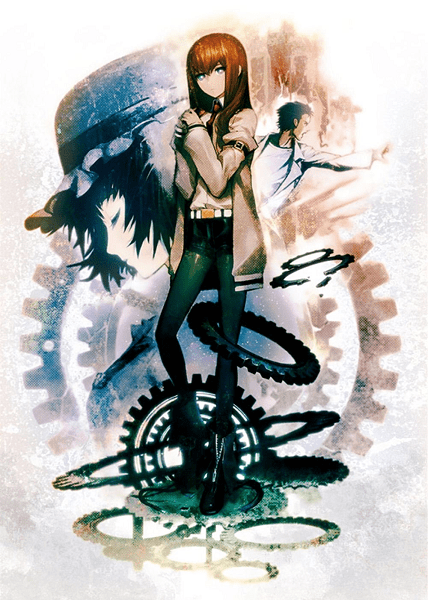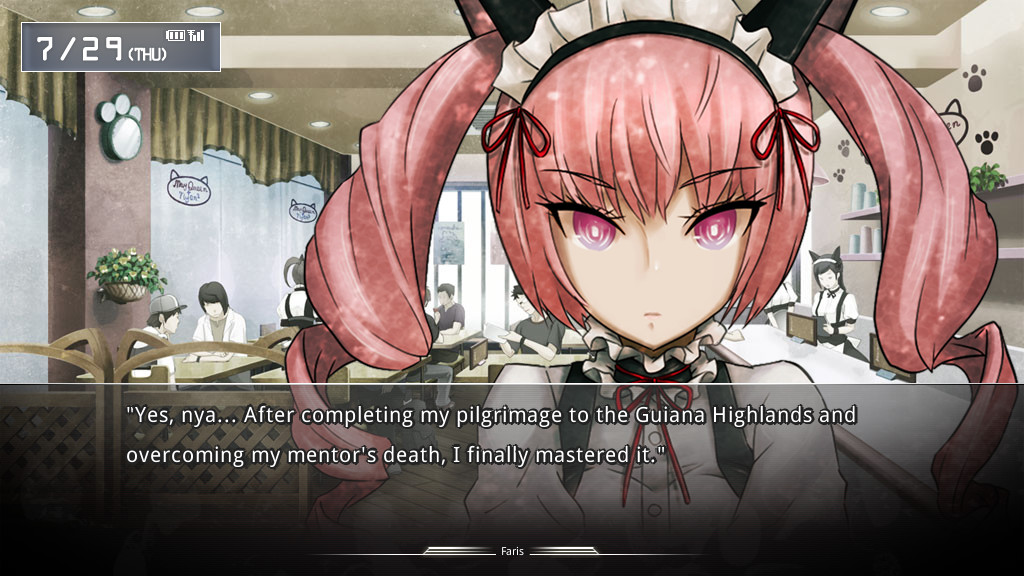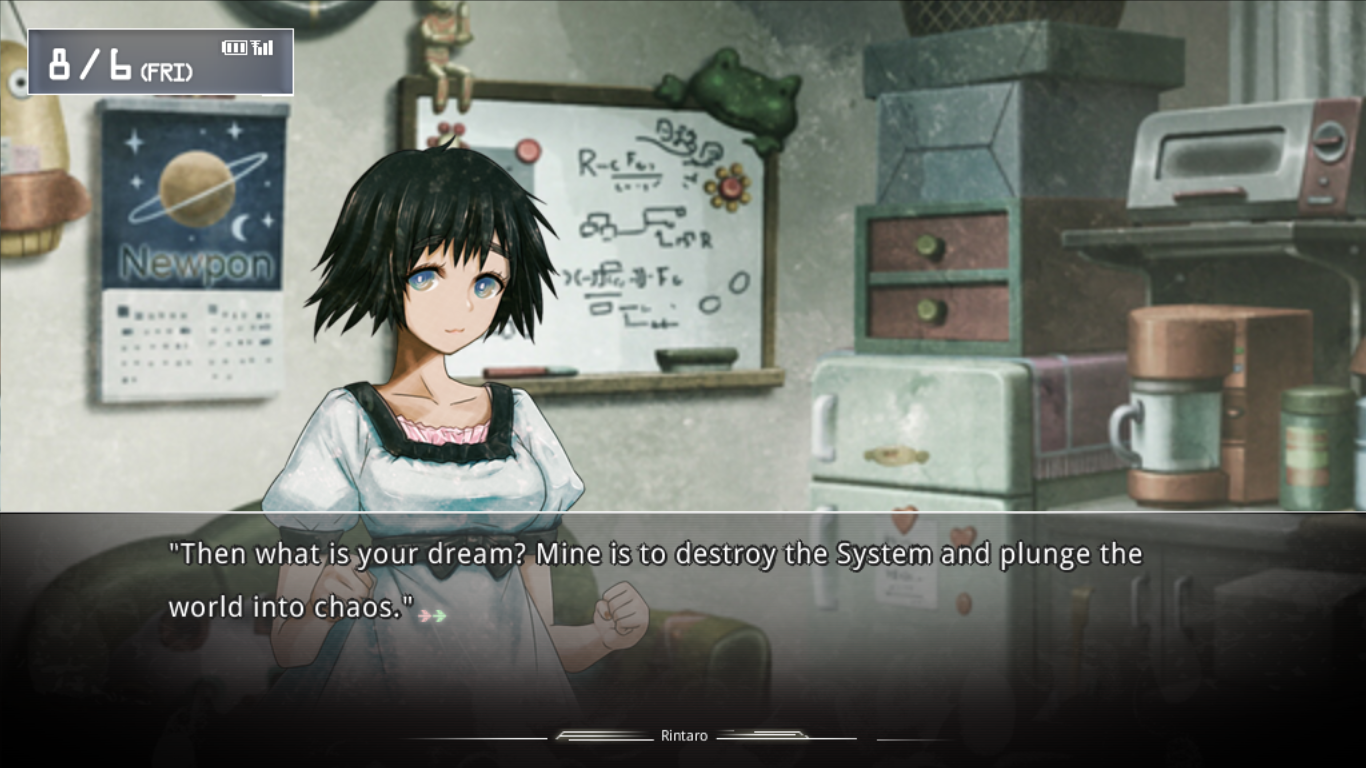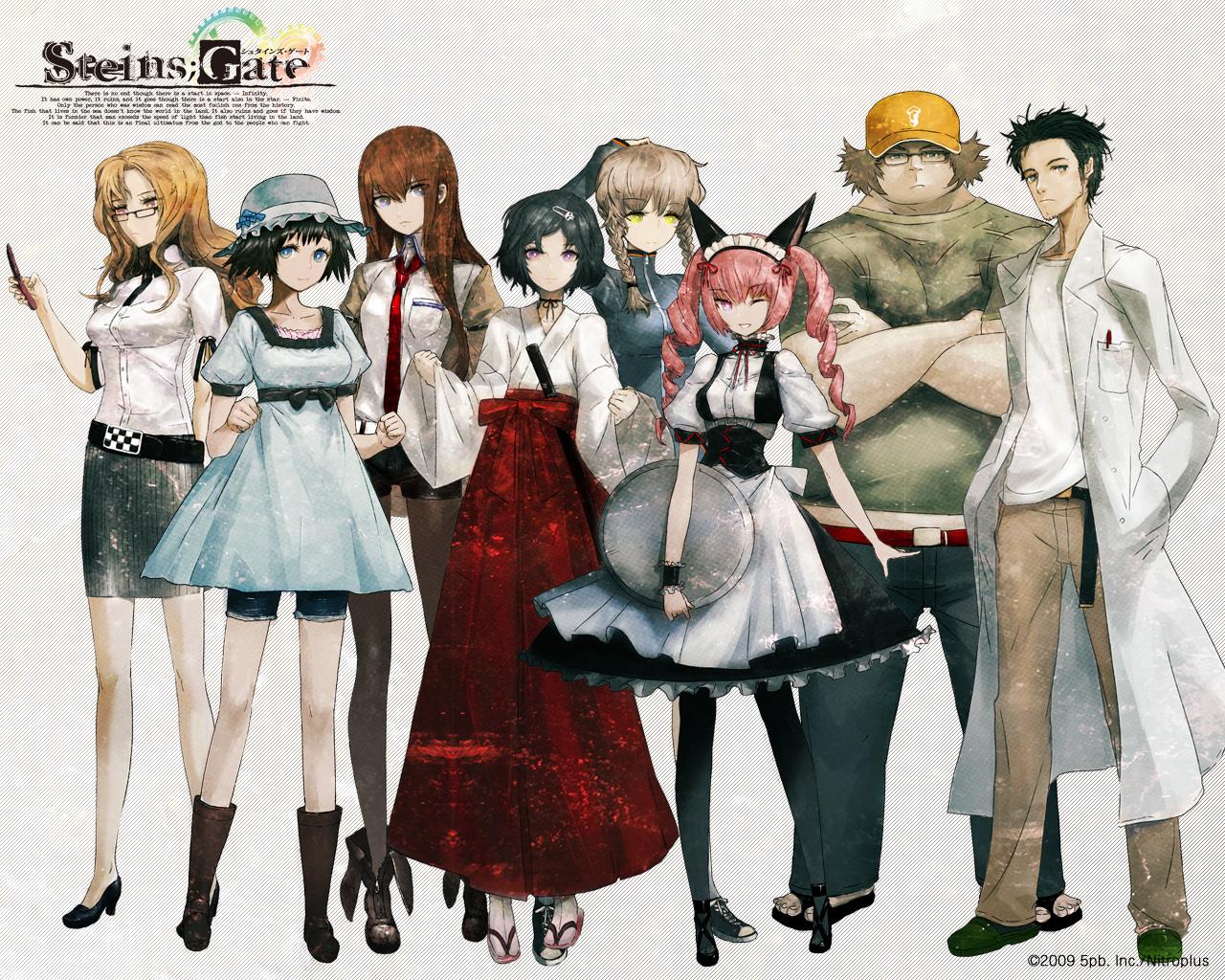
Steins;Gate – A science-adventure tour-de-force that is a masterclass in character development
*****
Reviewed April 22, 2016 on PlayStation Vita, PlayStation 3
Leave a comment on Giant Bomb
I love time travel and time manipulation stories. Even when poorly executed, or lacking in scientific rigour, I am usually entertained by them if the central idea is sound. Steins;Gate is not that - Steins;Gate is a genuinely masterful piece of story-telling, that intelligently weaves hard science, interesting characters and great music into a both heart-wrenching and comedic look at the perils of messing with time.
I went into Steins;Gate knowing very little about it - I had messed around with the Japanese Xbox 360 version briefly a few years ago, and read the deck text on the Giant Bomb wiki, but that was about it. Knowing my love of time travel fiction, that was enough for me to pick up a copy of the game, and it quickly became one of the greatest games I have ever played.
The prologue and the opening of Chapter 1 is probably the quickest a game has ever grabbed hold of me, and it didn't let go until I realised I had played nearly 40 hours just three days later. This introduction to the world is extremely well-done, got me intrigued as to where the story is going, and not only destroyed the fourth wall but pretty much rebuilt it behind me. Any game that can position me (the player) as being inside the monitor instead of the characters, get me to grin at one of the lines, and immediately follow that up with "Ah, he just grinned!" is doing something right.
In many ways, Steins;Gate feels like a game I shouldn't like. It draws heavily on a subculture I have little to no interest in (moe / otaku culture for lack of a better descriptor), the main character (Okabe Rintaro) spends the first quarter or so of the game as an unsympathetic caricature of a "mad scientist", and the cat-maid café scenes felt like they were trying to drive me away from the game.
To its credit, the core narrative of Steins;Gate pushes through those issues, and easily overshadows them. The moe culture serves solely as a backdrop and doesn't particularly matter in the grand scheme of things, and the cat-maid café is a mere distraction (and in many ways provides some needed light relief) after its introduction.
Crucially, however, the reasons Okabe acts as he does, plus the trials he goes through during the game, rank amongst some of the best character development I have seen in any medium. He goes from being an unsympathetic caricature to one of the strongest characters in the game, and it is impossible to avoid sympathising with him as you see his world fall apart around him and you experience the immense lengths he goes through to correct his past and future mistakes.
It is in this complex web of mistakes that Steins;Gate really shrines. Many time travel stories collapse if analysed too closely - either the rules they have established for how time travel works, or known scientific facts, are contradicted in an unconvincing and plot-driven manner. Steins;Gate avoids these pitfalls. The science-fiction elements are completely grounded in science-fact (albeit with a few additions that are necessary to make time travel viable), and the plot never violates any of the rules of time travel that the characters discover over the course of the game. In fact, the few times that the rules are violated foreshadows the True End to the game, and it makes returning to those events and explaining the inconsistencies immensely satisfying. A throwaway line in a sea of confusion near the beginning of the game sets up the True End, but it is easy to forget or overlook. The reveal towards the end, as you realise those events don't fit together and that they don't play by the established rules, is wonderfully done, and really sets this game apart from stories like Virtue's Last Reward that fumble the landing and ultimately feel unsatisfying.
Despite the strength of the narrative, the true joy of Steins;Gate comes from the character interactions, and how those Okabe's interactions change over the course of the game. At first glance, they appear to be the sort of one-dimensional rogues' gallery that wouldn't be out of place in Metal Gear game - Makise Kurisu - a teenage, published scientist and Okabe's foil; Shiina Mayuri - childish and naïve, and in many ways the personification of the moe aspects of the game; Daru - a stereotypical otaku and super hacker; Kiryu Moeka - a shy girl who only communicates via text messages or email - to name a few.
However, as you delve deeper into the story, each of these becomes a fully fleshed out character, and their eccentric traits start to make sense. Each is well written, and well voice acted (Japanese voice acting often sounds a little odd to my ears, probably due to my unfamiliarity with it, but that is not the case here), and getting to know this characters is a joyous, though often emotionally painful, experience.
At its core, Steins;Gate is not a happy story, and you make a number of seemingly lose-lose choices at multiple points in the latter half of the game as the true impact of your meddling with time becomes apparent (I shall refrain from mentioning plot specifics here, as I feel the game is best experienced knowing as little as possible about how the narrative unfolds; Kotaku have a decent review if you wish to read more specific details). This leads to the multiple ends that the game offers, and you are repeated asked essentially "How many more lives can I ruin hoping to find a timeline that isn't messed up?". Knowing that altering the past to fix your mistakes could ruin the lives of characters you have come to know so well is an agonizing choice; one that takes its toll on both the player and on Okabe. You know that the True End can be found, but at what cost? is the central question of Steins;Gate, and experiencing it unfold is remarkable.
From a gameplay perspective, Steins;Gate is a visual novel, so interaction is fairly limited. You can respond to emails at a variety of points during the game, though the impact this will have is often unclear - frequently all that happens is you receive an extra scene, or a longer character interaction, but your choices here may also change the ending you get. You will also make a number of binary "Send this message to the past: yes/no?" choices, though the impact these have is usually obvious. A spoiler-free walkthrough may be required to see all that Steins;Gate has to offer, but I strongly recommend not doing that until you have discovered at least one ending naturally (you can skip through text you have already read fairly quickly, so repeating a section of the game to pick a different choice is not an arduous process).
Overall, Steins;Gate is a fantastic visual novel, and a great introduction to that style of game. You will come to care about the characters in a way I haven't since Persona 4, the plot is intriguing from the outset, both heart-warming and heart-breaking in equal measure, and the complexity yet consistency of the time travel constructs will set your mind racing about what could happen next. Combine that with a unique visual style, and fantastic well-used music, and you discover one of the greatest games I have ever played. If you enjoy science-fiction or time travel, you simply must play this game (it is the choice of Steins;Gate).
El Psy Kongroo.


